Special statistical services measure the popularity of search engines. The rankings of search engines differ significantly worldwide. Although Google holds an absolute leadership position in the global search engine market, this search engine does not always rank first in every country.
In some regions, local search engines have a considerable market share, which can be attributed to cultural, linguistic, and sometimes political factors. This is particularly observed in countries with strict internet regulation or in markets with strong domestic technology companies.
The diverse search engine landscape demonstrates the complexity of the global internet and emphasizes the importance of regional preferences and conditions in the use of online services.
The data and charts for this article are sourced from StatCounter.
Table of Contents
Search Engine Usage in Europe
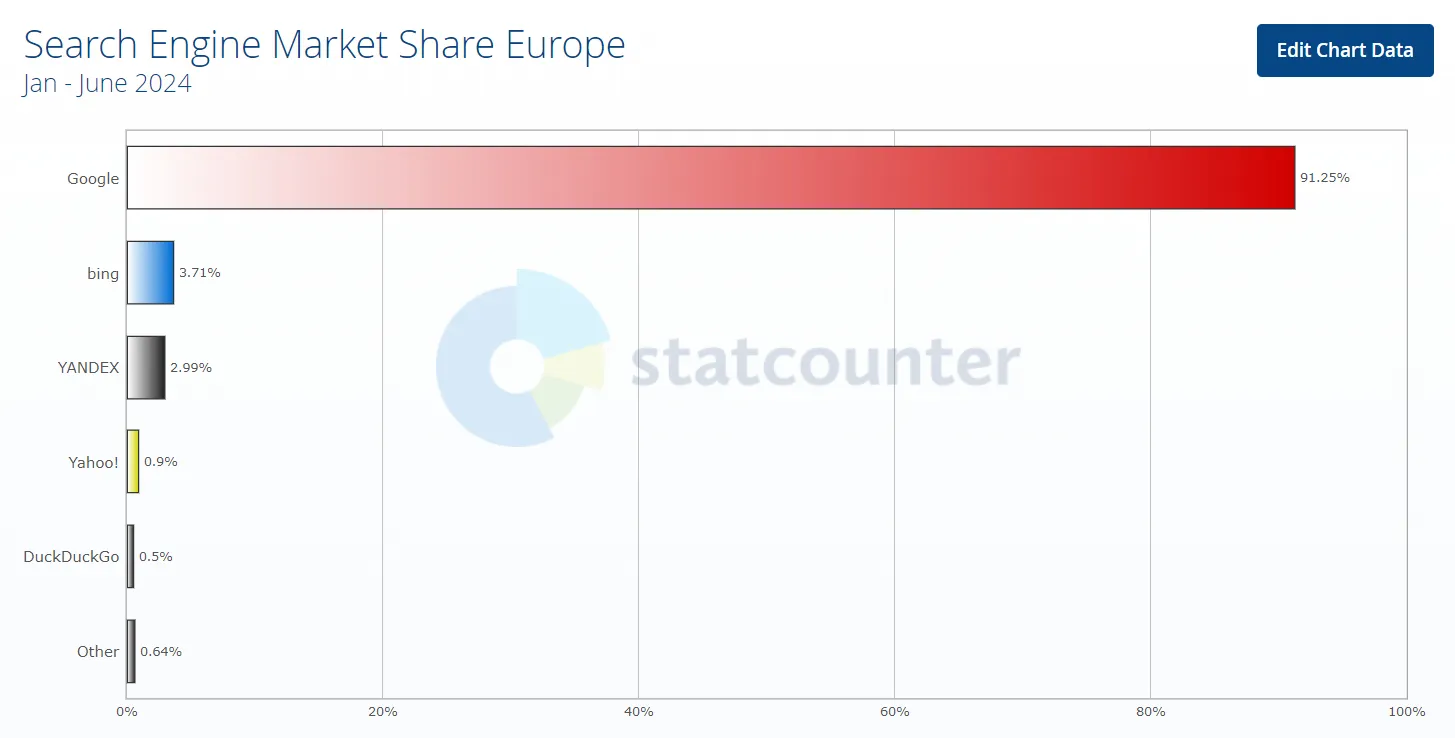
The chart displays the market shares of various search engines in Europe for the period January to June 2024.
- Google dominates the European search engine market with an overwhelming share of 91.25%.
- Bing holds the second position with a market share of 3.71%.
- Yandex, the Russian search engine, follows with 2.99%.
- Yahoo! takes the fourth spot with a share of 0.9%.
- DuckDuckGo, known for its focus on privacy, has a share of 0.5%.
- All other search engines combined make up only 0.64% of the market.
This statistic highlights Google's dominant position in the European search engine market, while other providers can only claim relatively small market shares.
Search Engine Usage in China
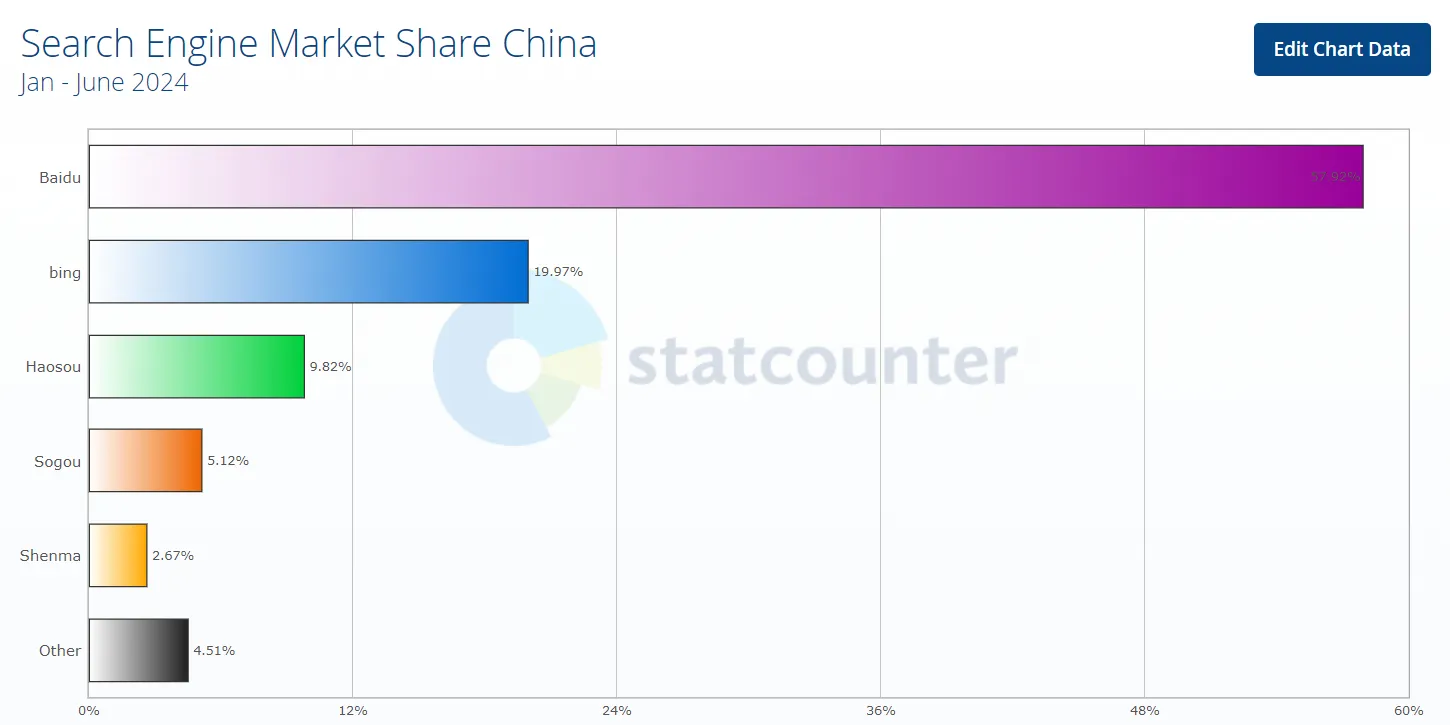
The chart displays the market shares of various search engines in China for the period January to June 2024.
- Baidu dominates the Chinese search engine market with an impressive share of 57.91%.
- Bing is shown in second place with 19.97%, but this should be critically assessed.
- Haosou follows with a market share of 9.82%.
- Sogou has a share of 5.12%.
- Shenma captures 2.67% of the market.
- Other search engines collectively account for 4.51%.
China has its own unique internet atmosphere as it is effectively cut off from the global network. This is known as the "Great Firewall of China" - a system of internet censorship and surveillance. Many Western services like Google, Facebook, or Twitter are blocked in China.
This digital isolation has led to the development of an independent Chinese internet ecosystem. Chinese companies like Baidu, Alibaba, and Tencent have created services that resemble those of Western companies but are specifically tailored to the Chinese market.
Regarding Bing, it is important to clarify: Bing does operate in China, but it must adhere to strict censorship laws to maintain its presence in the Chinese market. This involves filtering search results according to state regulations. Despite these adjustments, Bing's market share is likely lower than depicted in the chart, as domestic search engines like Baidu still dominate (my opinion based on other public sources).
Search Engine Usage in India: Google's Overwhelming Dominance
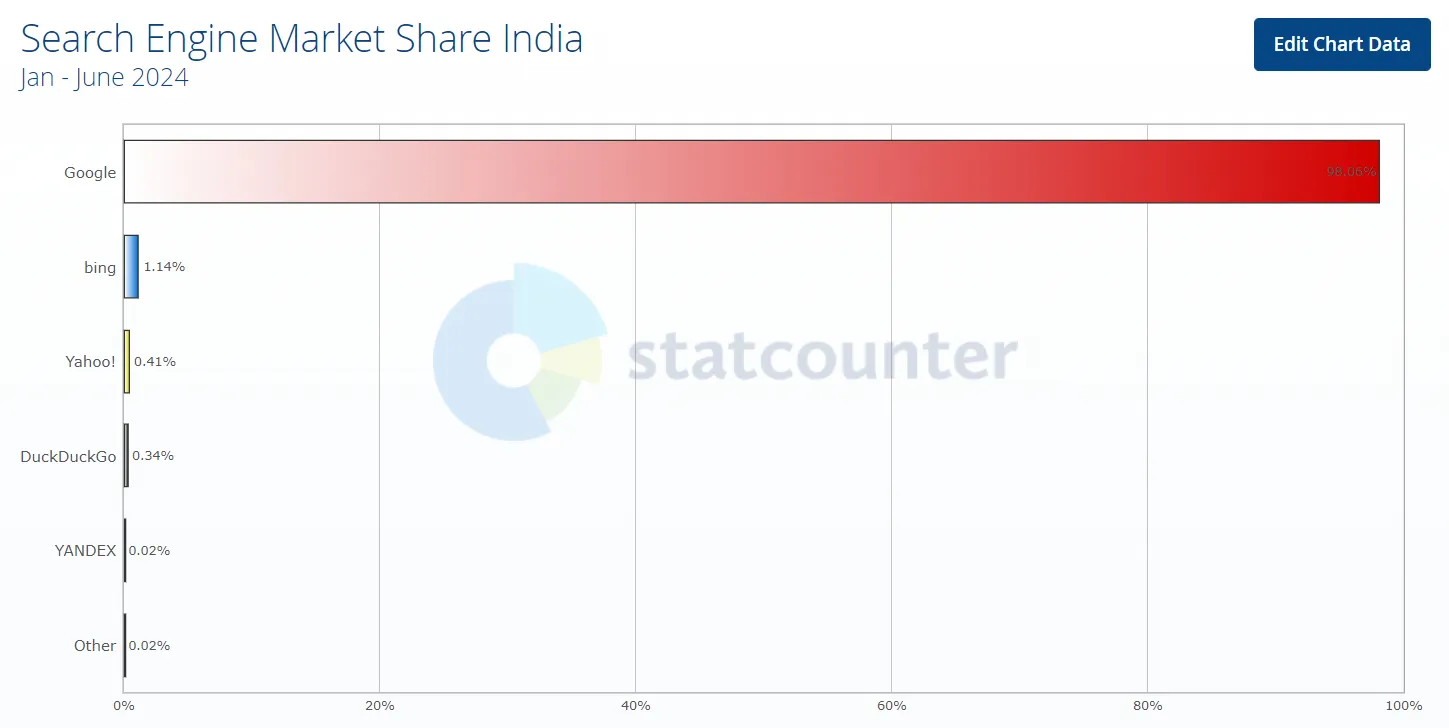
The chart displays the market shares of various search engines in India for the period January to June 2024:
- Google dominates the Indian search engine market with an overwhelming share of 98.07%.
- Bing follows at a distant 1.14%.
- Yahoo! reaches 0.41%.
- DuckDuckGo holds a share of 0.34%.
- Yandex and other search engines each have 0.02%.
This statistic illustrates Google's absolute dominance in the Indian search engine market. It is noteworthy how strong the concentration on a single provider is.
India and China share many similarities in terms of demographics and economic development. Both countries have large populations and are experiencing rapid economic growth. However, there is a crucial difference in terms of access to information:
India has an open access to the global internet, without the strict limitations that exist in China. This difference is clearly reflected in search engine usage. While in China, native platforms like Baidu dominate, Google has achieved a nearly monopolistic position in India.
This situation emphasizes how political and regulatory frameworks can shape a country's digital landscape. In India, free access to global services has led to a strong concentration on international providers like Google.
Usage of Search Engines in the USA
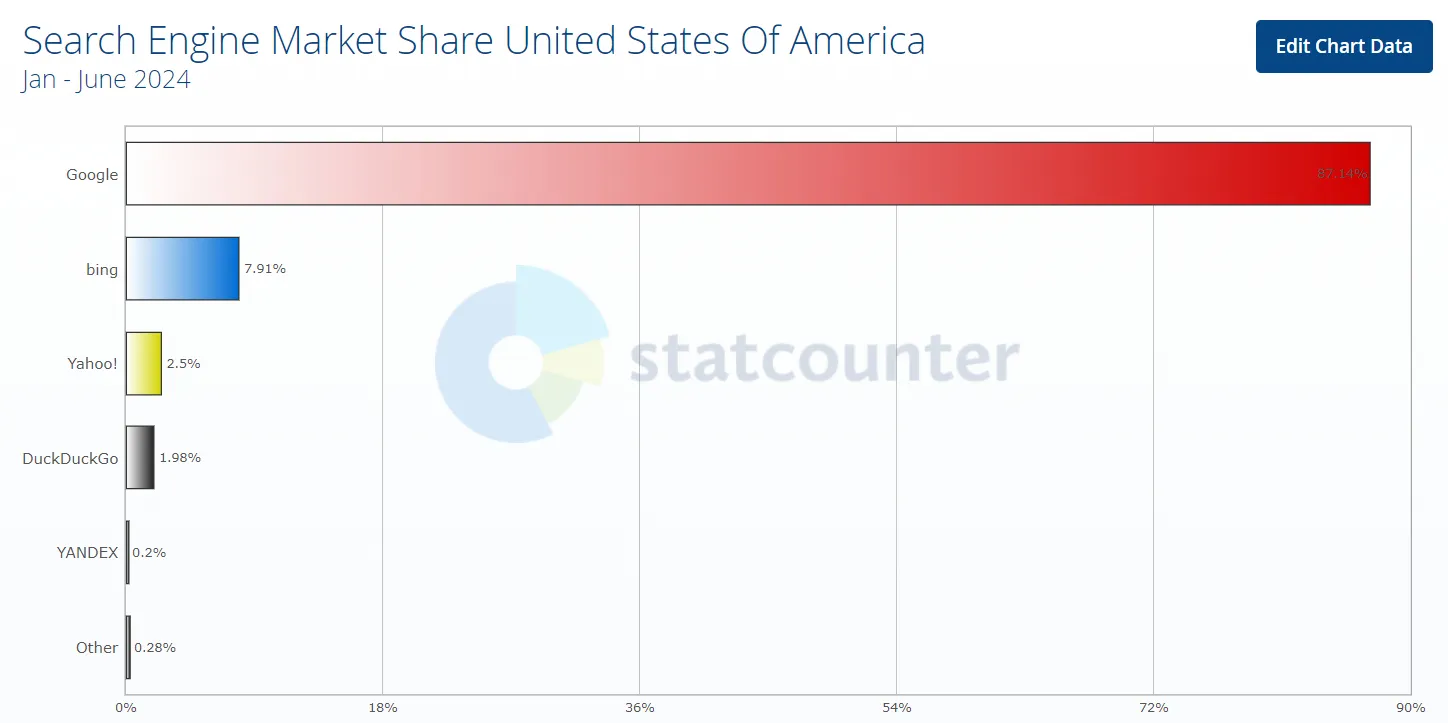
The diagram shows the market shares of different search engines in the USA for the period from January to June 2024:
- Google dominates the US search engine market with a share of 87.14%.
- Bing follows at a considerable distance with 7.91%.
- Yahoo! reaches 2.5%.
- DuckDuckGo has a share of 1.98%.
- Yandex accounts for 0.2%.
- Other search engines together make up 0.28%.
Similarly, the clear dominance of Google in the search engine market is evident in the USA. However, in comparison to other regions, it is noticeable that Bing holds a stronger position here.
This relatively stronger position of Bing in the USA could have several reasons. In my subjective estimation, an important factor is that Bing is a product of Microsoft and is integrated as the default search engine in Microsoft browsers. Since it is an American product, US users may be more loyal to it.
Global Market Shares of Search Engines
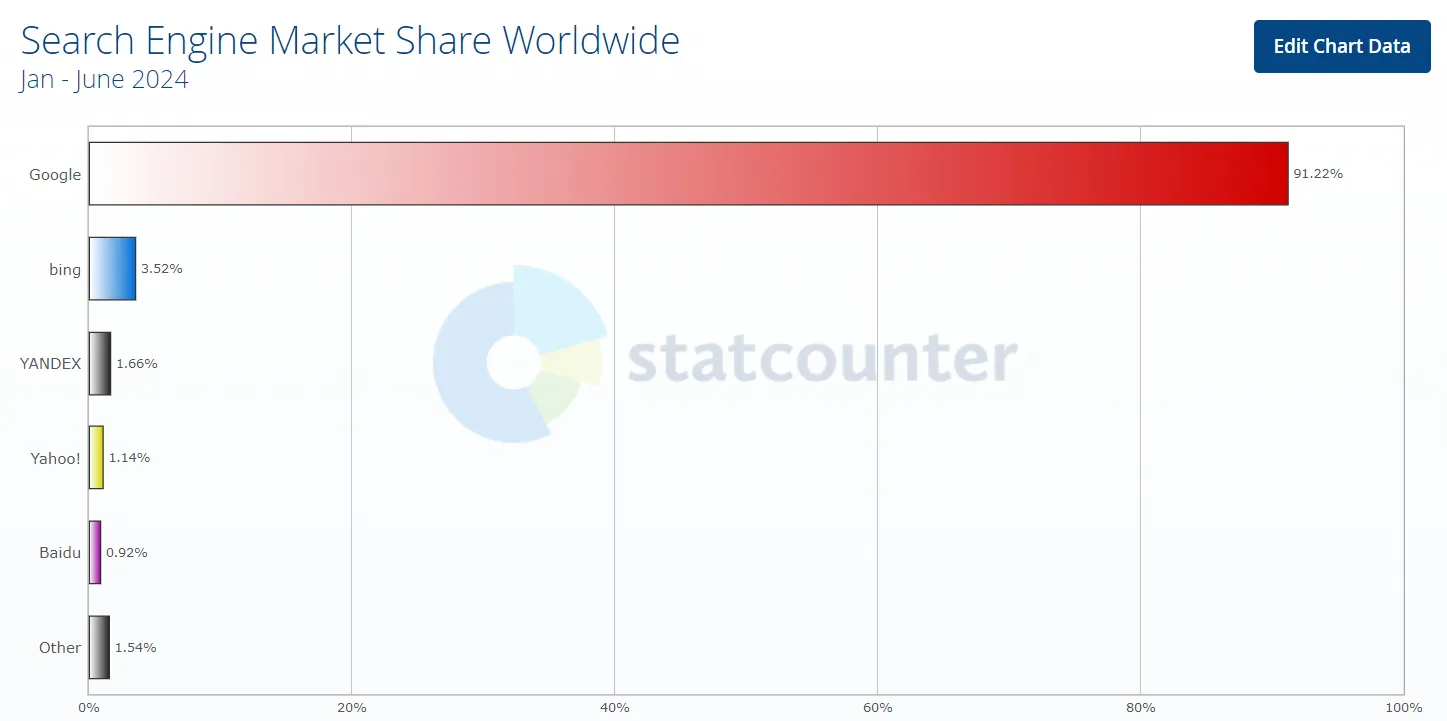
The diagram shows the global market shares of different search engines for the period from January to June 2024:
- Google dominates the global search engine market with an overwhelming share of 91.22%.
- Bing follows at a great distance with 3.52%.
- Yandex reaches 1.66%.
- Yahoo! accounts for 1.14%.
- Baidu has a share of 0.92%.
- Other search engines together make up 1.54%.
It is a remarkable phenomenon that is rarely observed in the market economy. By examining this diagram closely: On the one hand, there are alternatives to Google, but on the other hand, it is clear that in countries without restrictions on free access to information, Google apparently offers services of significantly higher quality. This makes the company the uncontested global market leader. This dominance is so pronounced that it is likely nothing will change in the foreseeable future. Google has established a lead that makes it extremely difficult for competitors to gain significant market shares.
There is nothing permanent except change.
Heraclitus
We wish Google all the best, but we should not forget that nothing lasts forever. It remains extremely exciting to observe what and when this situation will change.

